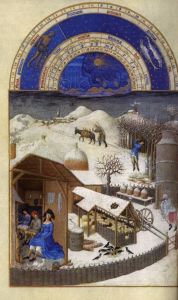Originally posted by Allison D. Reid:
 There is no doubt that the seasons ruled medieval life, dictating what work needed to be done and what food was available to eat, but did you know they affected sleep habits as well? With our ability to brighten up stores, homes, and streets with electric lights, our modern-day sleep patterns don’t change a whole lot with the seasons. Most of us aim for a solid 8 hours and adjust our bed times and alarm clocks accordingly.
There is no doubt that the seasons ruled medieval life, dictating what work needed to be done and what food was available to eat, but did you know they affected sleep habits as well? With our ability to brighten up stores, homes, and streets with electric lights, our modern-day sleep patterns don’t change a whole lot with the seasons. Most of us aim for a solid 8 hours and adjust our bed times and alarm clocks accordingly.
But imagine during the long winter nights, going to bed shortly after dark, and not getting up until sunrise? That’s roughly 14 hours a night—a bit too much sleep!
 According to historian Roger Ekirch, medieval adults broke up their sleep into two parts, with a time of wakefulness in between. They might use this time for intimacy, prayer, study, light household chores, or even visiting neighbors. After an hour or two, they would go back to bed until the sun rose. This was common practice for everyone, including monks, who were required to get up in the middle of the night as part of their prayer rituals. This was thought to protect the monastic community and its surroundings from demonic attacks. Children were the exception to the “first and second sleep” norm, and it was recommended that they sleep straight through the night.
According to historian Roger Ekirch, medieval adults broke up their sleep into two parts, with a time of wakefulness in between. They might use this time for intimacy, prayer, study, light household chores, or even visiting neighbors. After an hour or two, they would go back to bed until the sun rose. This was common practice for everyone, including monks, who were required to get up in the middle of the night as part of their prayer rituals. This was thought to protect the monastic community and its surroundings from demonic attacks. Children were the exception to the “first and second sleep” norm, and it was recommended that they sleep straight through the night. During the winter months the shortness of the days, and lighter workloads, allowed abundant opportunity for sleeping, but summer was quite different. Field labors in the heat of the sun were more intensive, and exhausting. Under the feudal system, people were required to first labor for their lord or king before they took care of their own fields and gardens. This made for very long, back-breaking days that didn’t always leave enough time to sleep, especially in the northernmost areas of Europe. The remedy? Afternoon naps.
During the winter months the shortness of the days, and lighter workloads, allowed abundant opportunity for sleeping, but summer was quite different. Field labors in the heat of the sun were more intensive, and exhausting. Under the feudal system, people were required to first labor for their lord or king before they took care of their own fields and gardens. This made for very long, back-breaking days that didn’t always leave enough time to sleep, especially in the northernmost areas of Europe. The remedy? Afternoon naps.
Naps were also common year-round for those who were expected to work at night while everyone else slept, or for those whose jobs entailed a lot of waiting. These would primarily be guards and servants. If they couldn’t go home to nap in bed, they would settle in someplace where they could sleep sitting up.
More information about sleep will be in my next post, where I’ll talk about beds, sleeping arrangements, and sleeping attire.
Learn more about the daily life in Middle Ages by browsing previous posts in the Medieval Monday Index.


No comments:
Post a Comment